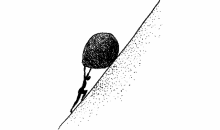
The path to mastery has many small ends but no final ending.
You pursue mastery until you die and continue to do so in the next world understanding that mastery as a means to fulfillment is universal across all dimensions of time and space and life and death.
Some call sleep the tiny death. Before we sleep as part of our nightly primer, we meditate. By meditating we prepare for our death.
Miyamoto Musashi, the legendary samurai who wrote The Dokkōdō only a few days before his death in Rigando cave, had his final and most famous duel against Sasaki Kojirō who wielded the legendary “drying pole” sword, on Ganryu island.
Musashi won.
After this match, Musashi no longer dueled, but instead taught martial arts & philosophy to his disciples.
The path of dueling with swords ended for him, but the path of swordsmanship continued, with Musashi taking the position of instructor instead of a competitor.
He walked the same path after retiring from dueling.
This transition applies to all martial arts, and many paths to mastery in the domain of body, of which competition typically belongs to the athletic and youthful but not always.
The path of being a competitor in the body domain can end. This is why it’s crucial to have other masteries outside of the body domain, outside of competition–because you can only compete in the body domain for so long while the mind is longer-lasting and the spirit is ever-lasting.
Even if the wanderer decides to stop competing and does not want to coach, the wanderer can still practice their body mastery until they die, like the grey-haired boxer who no longer competes but continues to show up to the gym because mastery is an expression of the self and expressing the self provides fulfillment.
The pursuit of pleasure
There is no end to the pursuit of pleasure so pleasure must never be pursued.
The pursuit of mastery is difficult, one reason which makes it fulfilling. It’s easy to disengage from the pursuit of mastery because of that difficulty.
Disengaging from the pursuit of pleasure is difficult, demonstrating the danger of the pursuit of pleasure. Even when pleasure is painful, it is difficult to disengage.
Do not put pleasure in your crosshairs.
Pleasure must be controlled. The wanderer who does not control their vices will find themselves in pursuit of their vices.
Pleasure is best in small doses because pleasure must be manually stopped, whereas the pursuit of mastery has natural stopping points like mental/physical exhaustion where performance decreases and the wanderer knows they must rest. It is during this rest that the wanderer can take comfort in pleasure–resting at the Inn–which is rewarding when the wanderer is exhausted from wandering down the path.
There is no small or large end to pleasure because the pursuit of pleasure is unnatural and unfulfilling.
When the wanderer pursues pleasure, like all pursuits the wanderer aims for fulfillment, which pleasure cannot provide.
Wanderers develop “tunnel vision” on their paths and they often cannot see outside of the path. This is good for Mastery, but a trap for those pursuing pleasure.
Those pursuing pleasure will not be fulfilled, nor will they look outside of the path of pleasure to find fulfillment because of their tunnel vision, damning themselves to pursue what cannot be fulfilled, equating to a life without meaning or fulfillment.

Sisyphus was condemned to eternally move a boulder up a hill, only for the boulder to roll back down whenever it reached the top.
This myth shows the folly of pursuing pleasure in search of fulfillment.
Core Takeaways
While the path may end for competition, there is no end to practice or instruction.
When you conclude your competitive chapter, you should consider passing your knowledge down to those who are walking the same path as you but are less experienced. A master passing down knowledge extends the path of their chosen mastery.
Do not pursue the path of pleasure because it has no natural ends.
Pursuing mastery has natural endpoints like exhaustion of body or mind. Pleasure has no natural endpoints. It is crucial to be aware of this.
Practicing on the path of mastery is worship. It glorifies the spirit of the individual and provides them with fulfillment.
Read next:











